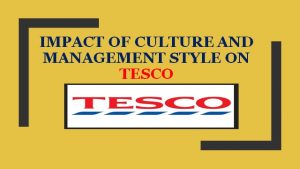Impact of culture on Tesco: Though Tesco is a global brand of grocery retail it has a number of customers with different religions and cultures. This cultural pattern affects behavior, need, and demand. Management of Tesco needs to focus on its customers’ demand to analyze their culture too. A survey can be organized and run by Tesco to understand the cultural effect on the purchase pattern of the customers within a common community, are or society (Eaglesflight, 2019).
Impact of culture and management style on Tesco

Organizational culture also affects the pattern of Tesco to handle its functions within and outside of the company. Culture is important to make an environment within the organization to work frequently with the employees. If the workers get a positive environment in the workplace their outcome gets bigger than ever. Tesco management focuses on the culture and environment to motivate its employees to work better (Cascio, 2006).
Impact of management style on Tesco: Tesco has the strongest team of management which is proved through their overall management procedures that have been already explained. The impact of their management system is explained below:
Directive: After planning a strategy it is necessary to organize the resources and elements together to direct the function according to the plan and decision of the authority. Proper direction helps to find out the right way on which the functions are needed to be done. The direction is also needed to manipulate positively the employees to do the work in an effective efficient way. The direction is needed in every step of the operation management. The proper management team is always aware of the direction procedures as well as the directive ability of the team leader (Eaglesflight, 2019).
Authoritative: Authoritative leaders are able to direct with the long term mission and vision. They have the skill to diagnose the future and analyze the outcome of a given input. This skill is necessary to save both money and time. Without knowing the cause and effect the invested money and time can be resulted in losses. An authoritative leader has the ability to measure the outcome from the input and he can also prepare for the option if there occurs any critical situation in case (Cascio, 2006).
Participative: This is also known as the democratic leadership. This type of management comprises an overarching objective of fostering commitment and consensus across the team. This process of management encourages every team member or employee to raise their voice and participate in decision making. Team members have the authority to say their opinion about any project or function regarding operational management. This helps to increase the confidence of the employees and they are motivated to think of themselves as the company’s important element like the authority of the owners (Brooks, 2006).
Additional resources: To manage the overall operational function within an organization it is necessary to arrange and collaborate all the resources and elements together. A good leader is able to source them and brings them together. On the other hand, some additional resources are also needed in the production or functional department, such as liquid capital. Management is in charge to collect essential additional resources when it is needed. Tesco always focuses on the management of its additional resources (Brooks, 2006).
Written by
Email: [email protected]
